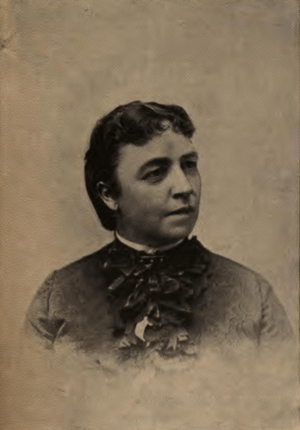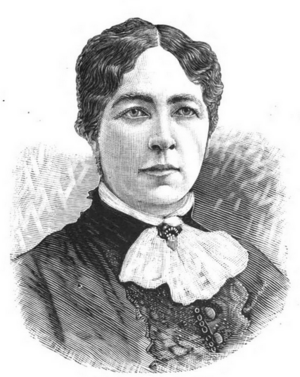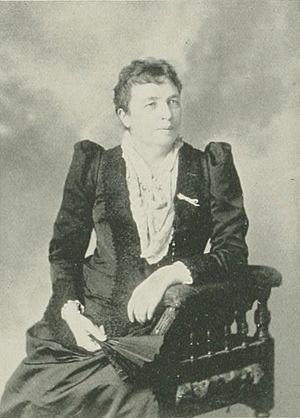Mary Torrans Lathrap facts for kids
Quick facts for kids
Mary Torrans Lathrap
|
|
|---|---|

"A Woman of the Century"
|
|
| Born | Mary Torrans April 25, 1838 Jackson, Michigan, U.S. |
| Died | January 3, 1895 (aged 56) Jackson, Michigan |
| Resting place | Mount Evergreen Cemetery, Jackson, Michigan |
| Pen name | Lena |
| Occupation | poet, preacher, suffragist, social reformer |
| Language | English |
| Nationality | American |
| Spouse |
Carnett C. Lathrap
(m. 1864) |
Mary Torrans Lathrap (born Mary Torrans; April 25, 1838 – January 3, 1895) was an important American woman from the 1800s. She was a talented poet, a powerful preacher, and a strong supporter of women's rights. Mary also worked hard for the temperance movement, which aimed to improve society.
For 20 years, she was a leader among women in Michigan. These women worked for social improvements, including the temperance movement. They wore a white ribbon as their symbol. Mary became a licensed preacher in 1871. She led Michigan's Woman's Christian Temperance Union starting in 1882. She also helped start the state's suffrage (women's right to vote) organization in 1870. Mary Torrans Lathrap passed away in 1895.
Contents
Early Life and Education
Mary Torrans was born on April 25, 1838. Her family lived on a farm near Jackson, Michigan. Her parents were Presbyterians from Scotland and Ireland. Mary grew up in Marshall, where she went to public schools.
She loved reading and writing from a young age. When she was just 14, she wrote for local newspapers. She used the pen name "Lena" for her writings. Mary became involved with her church when she was about 18 years old.
Mary Lathrap's Career
From 1862 to 1864, Mary taught in public schools in Detroit. In 1864, she married Carnett C. Lathrap. He was a surgeon in the army. In 1865, they moved to Jackson. There, Mary joined the Methodist Episcopal Church. She became a speaker in church groups.
In 1871, Mary was given permission to preach. She began preaching in a church in Michigan Center. Her speeches inspired many people. For years, she worked as an evangelist, which means she traveled and preached. Thousands of people were influenced by her messages.
Working for Social Change
Mary was very active in the Women's Crusade, a movement for social reform. She helped start the Woman's Christian Temperance Union. She served as the president of this organization in Michigan starting in 1882. Her work with this group was a big part of her life for many years.
She worked in different states to help pass important laws. For example, she helped get a law passed about scientific education. She also supported campaigns in Michigan, Nebraska, and Dakota Territory. In 1878, she helped pass a bill in the Michigan legislature. This bill provided money to create the Girls' Industrial Home in Adrian. This was a special school to help young girls.
Mary also wrote for The Union Signal, a newspaper for the temperance movement. In 1890, she was part of the Woman's Council in Washington, D.C.. This council brought together women leaders to discuss important issues.
Writing and Speaking
Mary spent much of her life preaching and speaking in public. But her writing was also very important. She wrote many excellent poems. She wrote enough poems to fill a large book.
During her busy years of preaching and temperance work, her writing took a backseat. Later in her life, she wrote more. Her poems honoring James A. Garfield and John Bartholomew Gough were very popular. Many of her other poems were also widely shared.
Mary's lectures were always successful. She was comfortable speaking about temperance, giving general lectures, preaching in church, or writing at her desk. Her powerful speaking style earned her the nickname "The Daniel Webster of Prohibition." This name showed how skilled she was at speaking. She died on January 3, 1895.
Selected Works
- What means this stone? : a poem, 1891
- The poems and written addresses of Mary T. Lathrap with a short sketch of her life ..., 1895
- No uncertain sound : Mary T. Lathrap, selections from her most recent speeches : dead, but yet she speaks., 1895
- Rare gems from the literary works of Mary T. Lathrap : born April 25, 1838, died January 3, 1895. 1895
 | Stephanie Wilson |
 | Charles Bolden |
 | Ronald McNair |
 | Frederick D. Gregory |



